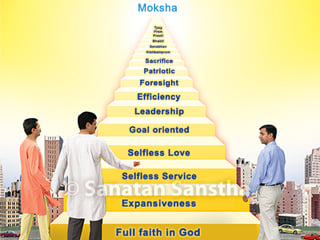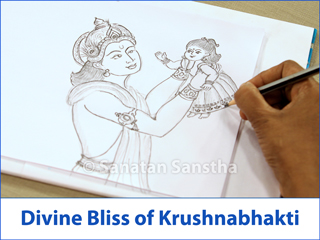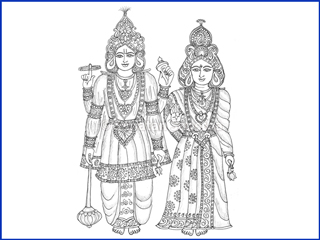Contents
- 1. Intellectual opponents
- 2. Types of curious individuals
- 3. The seeker
- 4. The disciple
- 5. The Saint
- 6. Guru
- 7. opponents, curious individuals, Seeker, Disciple, Saint & Guru
- 8. Possessing attitude of curiosity is important to bring about the process of making the intellect sattvik by which the progress of a curious occurs stepwise from a seeker to a disciple and finally to the state of a Saint or Guru

1. Intellectual opponents
Till the time the intellect of an individual is Tama-predominant, neither the interest in Dharma nor in spirituality gets awakened in his mind. It is even difficult for him to comprehend knowledge regarding these subjects. Such individual is either an atheist or a heretic. At times, such intellectuals ask questions only with the intention of opposing Dharma or spirituality and not with a desire for understanding these subjects. They try to analyse the spiritual aspects at intellectual level and contest them for the sake of opposing. The intellect of these individuals is extremely tamasik and extroverted. Besides, they also have a high ego. Instead of referring to them as tamasik curious, they are called as intellectual opponents. Rationalists are opponents at the intellectual level and perform the task of opposing Dharma and Spirituality at the intellectual level.
2. Types of curious individuals
2A. Rajasik curious individuals
When the intellect of an individual becomes Raja-predominant, the curiosity to find causes behind various life events gets awakened. When searching for these causes the sattvikta of his intellect grows. It is at this juncture that to some extent interest in Dharma and Spirituality gets developed in his intellect. Such an individual tries to get his doubts, arising in his mind, clarified either by asking various questions on Dharma or Spirituality or by reading different Holy texts or articles. Gradually his inclination towards atheism decreases and he starts becoming aware that there is a world beyond the intellect. Such individuals are rajasik curious.
2B. Sattvik curious individuals
When the intellect of an individual becomes Sattva-Raja predominant, he is able to grasp the knowledge on Dharma or Spirituality from various Holy texts or articles and he begins to abide by Dharma or performs casual spiritual practice. As a result, he gets spiritual experiences of the primary stage. This increases his faith in Dharma or spirituality and he starts becoming a believer. Such individuals are called as sattvik curious.
2C. Curious individuals that perform occasional spiritual practice
Spiritual experiences obtained from small activities of abiding by Dharma and performing spiritual practice inspires the individual to increase them further. This makes him abide by Dharma or perform spiritual practice continuously for a few days or months and thereby he starts getting practical knowledge regarding Dharma and spirituality to some extent. This firms up his faith in Dharma and spirituality. Such an individual is called as a curious who performs spiritual practice occasionally.
3. The seeker
In the next stage, the intellect becomes completely sattvik and the individual experiences the various aspects of Dharma or Spirituality through spiritual experiences, instead of analysing them intellectually. This eliminates the obstacle of intellect from his mind and he is able to grasp subtle knowledge on Dharma or Spirituality easily. Such an individual becomes a seeker in the real sense of the term.
4. The disciple
In the next stage the faith of the seeker in the Guru (Spiritual Master) guiding him on the spiritual path gets further strengthened and he tries to adhere to His orders precisely. This leads to dissolution of his mind and he attains the level of a disciple. After attaining discipleship, the intellect of the seeker becomes more profound and the obstacle of intellect in his mind gets completely eliminated. Thereafter he believes that the Guru’s words are the absolute truth and also perceives the thoughts in Guru’s mind without being expressed. Therefore, his spiritual practice occurs smoothly as per His Guru’s expectations.
5. The Saint
In the next stage as the causal body, that is intellect of the individual becomes subtle and it starts merging with the causal body of the Guru and he attains the state of a Saint. That is why Saints can perceive the subtle thoughts related to past, present, and future. Instead of learning Dharma and Spirituality from external sources, they receive this knowledge from within. They also start understanding the implied meaning of the Guru’s teachings. This is how post dissolution of their mind, the process of dissolution of their intellect also begins. After attaining Sainthood, they are able to imbibe the subtlemost thoughts related to the past, present and future from the Universal Mind and Universal Intellect. That is precisely why Saints possess the potential to impart accurate spiritual guidance to spiritual aspirants, seekers and disciples to enable them progress spiritually. When Saints do not give guidance to others to nurture them into becoming disciples, they remain as Saints.
6. Guru
When Saints do not stop at the state of attaining Self-realisation but also start giving appropriate spiritual guidance to spiritual aspirants, seekers and disciples to help them make spiritual progress, that is when they act in accordance with thoughts imbibed from the Universal Mind and Universal Intellect and they attain the state of a Guru. If the temperament of such Saints is vyashti (individual) then they guide on that plane and if it is samashti (for the upliftment of society) then they guide at the level of samashti spiritual practice. If their temperament is a combination of vyashti-samashti then they guide seekers and disciples on both the planes.
7. opponents, curious individuals, Seeker, Disciple, Saint & Guru
| Predominant component from the triguns (Three components) | Spiritual level % | Subtleness of the intellect | Characteristics | |
|---|---|---|---|---|
| 1. Intellectual opponent | Tama | <= 30 | Gross | This individual symbolises ignorance and ego |
| 2. Types of curious individuals | ||||
| 2A. Rajasik curious | Raja-Sattva | 30 to 34 | 10% subtle | This individual assesses the veracity of Dharma or Spirituality at the intellectual level |
| 2B, Sattvik curious | Sattva-Raja | 35-39 | 20% subtle | This individual develops faith in Dharma and Spirituality |
| 2C. Curious individual performing occasional spiritual practice | Sattva-Raja | 40-49 | 30% subtle | This individual bears strong belief towards Dharma and Spirituality in his mind |
| 3. Seeker | Sattva | 50-59 | 50% subtle | This individual bears strong faith towards Dharma and Spirituality in his mind |
| 4. Disciple | Sattva | 60-69 | 60% subtle | Obstacle of intellect is completely removed from the mind of this individual and for him the Guru’s word is final. Therefore, he is able to perceive the thoughts in the mind of the Guru without his speaking to some extent |
| 5. Saint | Sattva | 70 to 74 | 70% subtle | He understands the thoughts related to the past, present and future from the Universal Mind and Universal intellect |
| 6. Guru
|
Sattva | 75 and above | 80% subtle | He understands thoughts related to past, present and future from the Universal Mind and Universal Intellect to a larger extent and also acts accordingly. |
8. Possessing attitude of curiosity is important
to bring about the process of making the intellect sattvik
by which the progress of a curious occurs stepwise from
a seeker to a disciple and finally to the state of a Saint or Guru

The attitude of curiosity is important to bring about the process of making the intellect sattvik. That is why when an individual is at a stage of a spiritual aspirant he acquires knowledge on Dharma or Spirituality first with the intellect and acts accordingly. Thereafter, his intellect becomes sattvik and he goes through the stages of a seeker, then disciple and finally Saint or Guru. In this entire process he does not even realise when dissolution of his intellect has occurred. When an individual transforms into a disciple, his faith in his own intellect starts reducing. If he follows the path of knowledge, his faith on scriptures become stronger and if he follows path of devotion, then his faith on teachings of the Guru become stronger. Thus the faith of the individual on intellect reduces and that on the teachings starts increasing bringing about his spiritual progress.
– Miss Madhura Bhosale (subtle knowedge), Sanatan ashram, Ramnathi, Goa
|

 Thoughts triggered on the meaning of being able to remain detached from Maya at the...
Thoughts triggered on the meaning of being able to remain detached from Maya at the... Efforts required to be undertaken to attain spiritual level of 61%
Efforts required to be undertaken to attain spiritual level of 61% 1000 Sanatan seekers attain 61% spiritual level, commence their journey towards Sainthood !
1000 Sanatan seekers attain 61% spiritual level, commence their journey towards Sainthood ! How can we reach the spiritual level of 60% ?
How can we reach the spiritual level of 60% ? Pictures of Balakbhav bestowing the Divine Bliss of Krushnabhakti
Pictures of Balakbhav bestowing the Divine Bliss of Krushnabhakti Picture of Shri Lakshminarayan at Jaipur drawn on the day of Ramnavami
Picture of Shri Lakshminarayan at Jaipur drawn on the day of Ramnavami